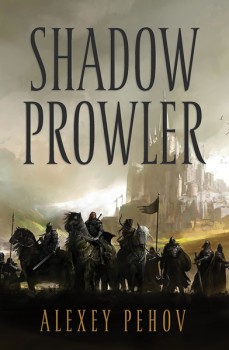Matthew David Surridge Reviews Shadow Prowler
 Shadow Prowler
Shadow Prowler
Alexey Pehov, translated by Andrew Bromfield
Tor (412 pp, $7.99, mass market edition February 2011)
Reviewed by Matthew David Surridge
Translation enriches a language, bringing in new styles, new influences, new approaches. The phrasing, the way of thinking, native to a given language can often still be found in a text translated into another tongue. Sometimes, even an ordinary story can gain a touch of originality in translation, a kick from unexpected turns of expression.
I don’t know for sure that this is the case with Alexy Pehov’s Shadow Prowler, not speaking Russian myself, but I wouldn’t be much surprised if it were. Pehov has written a fantasy trilogy, with elves and orcs and dwarves and wizards and a quest. Despite a few self-conscious deviations from the norm – elves have fangs, dwarves don’t grow beards – this first book, at least, feels fundamentally like a game of Dungeons & Dragons. The story is even structured around the exploration of an ancient burial ground, Hrad Spein, the Palaces of Bone, filled with traps, magic, and the undead; a quest, naturally, better undertaken by a small party of highly-skilled adventurers rather than a large army.
Conversely, the most eccentric thing about the story is its style. Relatively speaking; this is still an adventure tale, and the style is subordinate to the plot, and to the need to provide exposition and backstory, the need to keep things clear. But the first-person narration, by master thief Shadow Harold, presents a grumpy and occasionally self-pitying voice which is at least engaging. Pehov occasionally switches to the present tense for a key paragraph, which I found oddly effective. I do not know how much of the tone comes from Pehov, how much from translator Andrew Bromfield, and how much is an artifact of translation, but it puts a bit of a distinctive spin on material that is otherwise very familiar.
We begin the book following Harold as he burgles a wealthy estate in the city of Avendoom, after which he is captured by an elite group acting on behalf of the local rulers. An ancient magical item, he is told, is keeping a powerful evil magician at bay – but the artifact is weakening, and Harold is the only man skilful enough to retrieve it from its resting-place, Hrad Spein, so that it may be recharged. Since said resting-place is notable for its traps and secrets, Harold decides first to find plans and maps that will guide him through the ancient multi-level cemetery.
Unfortunately, those maps are tucked away in a cursed part of the city. Equally unfortunately, assassins hired by an irate guildmaster are out for Harold’s head. And a humanoid race of goat-men are convinced Harold has stolen an item of great value to their people. Throw a somewhat demented demon into the mix, and there is an enjoyable buzz of plot going on in the book.
In fact, once you get over the echoes of Tolkien in the form of the ancient artifact, the quest-story, the elves and dwarves and the setting, you notice that the actual structure of the book is much closer to Harry Harrison’s The Stainless Steel Rat: a thief tells the story of how he is captured by the good guys, and made to work for them. Shadow Prowler isn’t as inventive as Harrison, and the plot is neither as complex nor as neatly-worked, but it makes for a relatively unusual take on the standard fantasy tropes.
Overall, the book is competent, if unsurprising, but there is a major shift in tone about two-thirds of the way through, when the quest proper finally begins and the party sets out for Hrad Spein. Oddly, the book seems to slow down; without the feel of Avendoom, of Harold negotiating his way through the unpredictable city, interest dwindles. Harold becomes largely, though not entirely, a spectator as other members of his party take their chances to shine. The book feels off-centred; perhaps either the whole book should have taken place in Avendoom, or else the quest should have begun sooner. Certainly the ending is weak, lacking a real sense of climax; the party never does make it all the way to the dungeon.
Pehov tells a solid story, which moves along through a series of mysteries and action set pieces. It can’t really be called original, but it does what it does fairly well. Though not especially memorable, it is a decently crafted adventure. If nothing else, at least it is nice to see a translation from another language making its way into the Anglophone genre market; it raises hopes that we might see more unusual material in the future.
__________
A slightly different version of this review originally appeared in Black Gate Magazine #15
Matthew David Surridge is the author of “The Word of Azrael,” from Black Gate 14. His ongoing web serial is The Fell Gard Codices. You can find him on facebook, or follow his Twitter account, Fell_Gard.